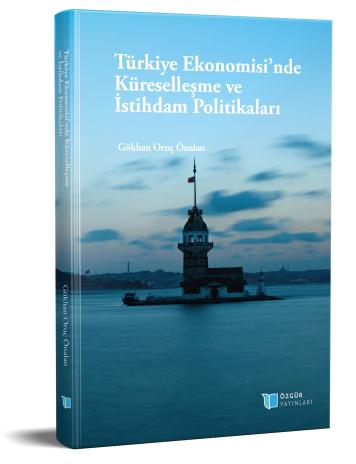
Türkiye Ekonomisi’nde Küreselleşme ve İstihdam Politikaları
İndir
Özet
İktisat tarihinin temel problematiği çerçevesinde bu çalışmanın amacı emek faktörünün niceliği ve verimliliğindeki artışların Türkiye ekonomisinin uzun dönemli iktisadi gelişme eğilimi üzerindeki etkisini, ekonominin 1980 yılından itibaren etkili olan küreselleşme ve neoliberal politikalar döneminde geçirdiği değişim ve dönüşüm üzerinden nedensellik çerçevesinde değerlendirmektir. Dünya ekonomisinin XIX. yüzyıldaki ilk deneyiminin ardından ikinci küreselleşme deneyimi 1970’li yıllardan itibaren hissedilmeye başlanmıştır. Bu dönemde devletler piyasa mekanizmasının işleyişine ağırlık vermiş, neoliberal iktisat politikaları kapsamında uluslararası ticarete yönelik engeller hafifletilmiş diğer yandan küresel sermaye hareketlerinin üzerindeki denetim azalmıştır. Ancak bu dönemde emeğin ekonomiler arasındaki hareketinin sınırlandırılmaya devam etmesi, küreselleşme olgusunun gelir eşitizliğine dair gerçeklerini ortaya koyar niteliktedir.
Türkiye ekonomisi de 1980 yılının Ocak ayından itibaren neoliberal iktisadi politikaları benimseyerek küreselleşme serüvenine katılmıştır. Bu küreselleşme hikayesi üç alt dönemde incelenebilir. Birinci dönem 1980-1987 dönemidir. Bu dönemde iktisadi politikanın temel hedefi müdahaleci ve iç piyasaya dönük ekonomi modelinin yerine, piyasa mekanizmasını öne çıkaran ve ihracat performansını ilerletmeye yönelen bir ekonomi modeli oturtmaktır. İkinci dönem 1987-2001 yıllarını kapsar. Bu dönemi iktisadi ve siyasi istikrarsızlıklar simgeler. 1989 yılından itibaren küresel sermaye hareketlerinin serbestleştirilmesi devletin dış finansman kaynaklarına erişimini kolaylaştırmış, koalisyon hükümetleri kısa vadeli siyasi tercihlere yönelerek mali disiplini terk etmiştir. Neticede Türkiye ekonomisi dış ekonomik şoklara daha açık ve daha kırılgan bir karaktere bürünmüştür. 2001 yılından itibaren bugüne kadar geçen süreç Türkiye ekonomisinin küreselleşme serüvenindeki üçüncü dönemdir. Bu dönemde siyasi istikrar sağlanmış olmasına rağmen, ekonominin düşük yurtiçi tasarruflar, cari işlemler hesabı açıkları, yüksek işsizlik oranı vb. yapısal iktisadi sorunları çözüme kavuşturulamamıştır.
Alman Tarihçi Ekolü’nün deyişi ile iktisat teori ve politikası tarihi gerçeklikler etrafında şekillenmediği sürece ütopya olmaktan öteye geçemez. Bir başka deyişle toplumların karşı karşıya kaldığı iktisadi problemlerin çözümüne yönelik ortaya konacak teori ve politikalar ancak tarihi yaşanmışlıkların üzerine inşa edilebilir, bunlar evrensel değil özneldir. Zaman ve mekana hapsedilen teorilerin evrensel geçerliliği olamayacağından hareketle bu çalışmanın amacı Türkiye Ekonomisi’nin işsizlik problemine Türkiye’yi önceleyen tarihi gerçeklikler bağlamında şekillenen çözüm önerisi sunabilmektir.

